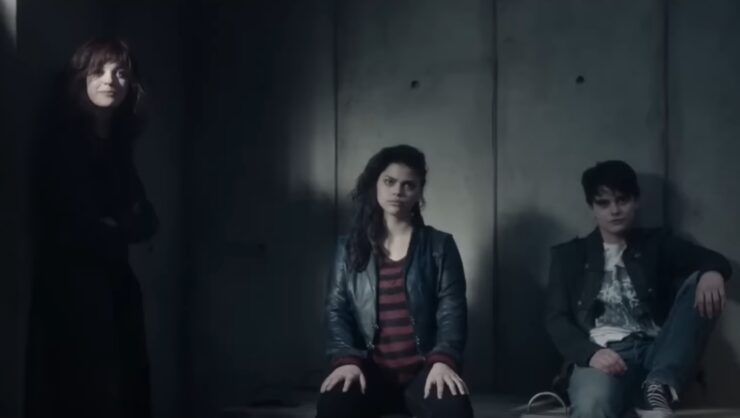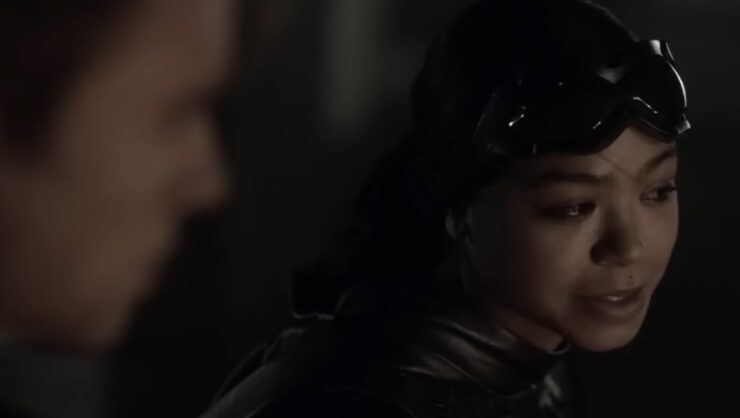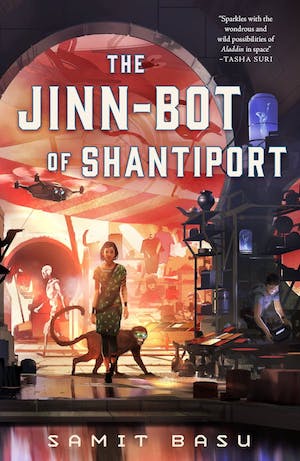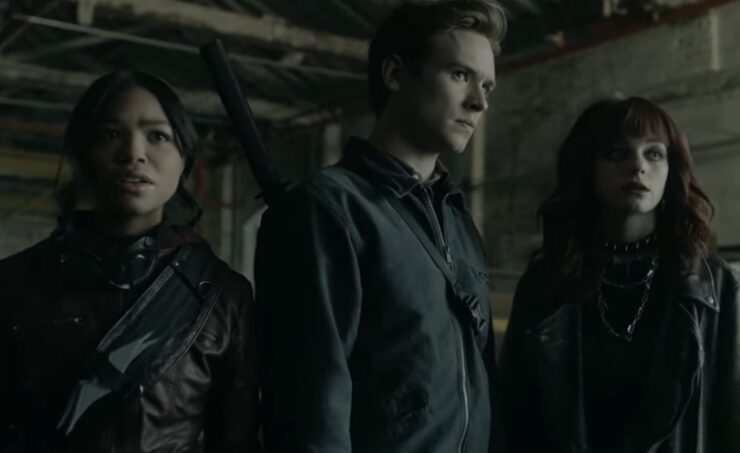Gotham Knights didn’t stand a chance. The show was announced as a new superhero venture, but its arrival coincided with the end of the CW’s Arrowverse as well as the changing of the guard for DC Studios, leaving the show in a stateless limbo among its DC universe peers. Add to that, the show borrowed its name from a familiar comic series run, and a hyped video game title, but it was connected to neither of them. Gotham Knights also featured a mostly unknown cast of actors playing a mostly unknown cast of characters. The show was doomed to be unwatched and unloved. And, eventually, the show was cancelled after only one season.
Like many others, I was apathetic towards the show. I wasn’t expecting much apart from some light entertainment. The pilot episode introduced us to the central premise of Gotham Knights—Batman is found murdered, and his true identity as Bruce Wayne is revealed. A group of young criminals is implicated in his murder, as is Bruce’s adopted son, Turner Hayes (Oscar Morgan). The fugitives band together and hide out in the city hoping to clear their names. With the help of some friends, they discover that Batman’s death is tied to an old conspiracy that could herald the end of Gotham City.
The pilot has all the hallmarks of a CW series—young characters fighting the system, love triangles, high school hi-jinks, and overcoming trauma. But the show becomes so much more with each episode, ending on a twist or a cliffhanger that keeps you coming back for more. I found myself racing through the screeners I received, and looking forward to each new episode as it came out after. We keep hearing about superhero fatigue, but I found this show intriguing and enjoyable, and I wish it was coming back. The first season has a contained story that will satisfy you, with a teaser at the end that promises the story continues beyond the screen. But I’m still going to miss tuning back into this world.
Some elements of the show may feel derivative. The score sounds like it’s from The Dark Knight trilogy—I thought I was listening to placeholder music in the screeners, but the final episodes had the same issue. Parts of Turner Hayes’ storyline is also an amalgamation of several Robin origin stories. From all the episodes, the finale feels most reminiscent of stories that have come before, especially (unfortunately) the Christopher Nolan trilogy. But again, there are a few twists to keep you guessing.

What works in the show’s favor is the story; comics have always loved secret societies, and the Court of Owls is a surefire way to grab the audience’s attention. The way the show unpacks who the Court is and how long they’ve had their talons in Gotham is compelling. I was invested in these revelations right alongside the main characters, especially because the show’s writers messed with our expectations throughout. If you thought it was weird that Harvey Dent’s (Misha Collins) identity dysmorphia was too convenient, that’s because it was triggered by the Court for their own purposes. Did you think there was something suspicious about Lincoln March (Damon Dayoub) and his wife Rebecca (Lauren Stamile)? You have a point, but you don’t know the half of it. Every time I thought I knew exactly how the story would pan out, the writers added another twist that left me shocked and excited. And they’re able to do that because Gotham Knights plays fast and loose with canon.
We get hints of established characters and Batman’s Rogues Gallery, without retreading the same old characters and storylines. The show also moves away from being Bruce Wayne/Batman’s story, which is a trend that I love. Stories set in Gotham City that aren’t about the city’s richest white boy are so refreshing, and Gotham Knights shows us why. We have a group of youngsters who have to use their street smarts and resourcefulness (plus the use of the school library) to get by.
Stories can’t work without a good set of characters, and despite some early hiccups, the main cast is engaging enough to buoy the story. Their banter and interactions, and their subsequent connection with one another worked beautifully.
The show introduced us to a brand new character, Turner Hayes, Bruce’s adopted son. He doesn’t exist in the comics—Bruce has a lot of sons, his former ward Dick Grayson, his ward-turned adopted son Jason Todd, his foster son (of sorts) Tim Drake, and his biological son Damian Wayne. There’s a reason why none of these characters appear on the show; it’s because they were all, at some point Batman’s sidekick Robin. They knew about Bruce’s secret life as the Caped Crusader and fought crime alongside him. Turner, on Gotham Knights, is shielded from Batman. He’s trained to fight, but not to be a crimefighter. He also starts off the show as incorrigibly privileged and arrogant. So, yeah, none of Bruce’s comic book sons would have fit the bill. For the longest time, Turner was the show’s weakest link, and it didn’t help that Oscar Morgan’s performance was severely lacking for the first half of the season. But he got better; I felt bad for hating on Turner so much, because he grows into a very likeable character by the end of the season. Did we need him? No. Turner felt like the cis white guy the showrunners hinged their hopes on, the audience stand-in that supposedly represents the majority of comic book lovers.
Though Turner is the lead, the show’s stars are the rest of the Gotham Knights. The scene-stealer for many will be Olivia Rose Keegan‘s Duela Doe, the Joker’s daughter. Keegan is so unhinged, yet vulnerable, she’ll win over hearts easily. Her character has a wonderful arc, and though it hinges on romance, I found the chemistry and the thawing of Duela’s heart extremely believable.

The only character who gets short shrift is Carrie Kelley. As the first live-action Carrie, that too played by an actor of colour, Navia Robinson, she deserved a cool supersuit and to be in the limelight. After all, she’s the only character who has actual superhero experience. Granted, Carrie is younger than the rest of the Knights (she’s only fifteen), but her connection to Bruce Wayne/Batman was often sidelined in favor of Turner’s. I wanted her to headline more of the fights, but she was relegated to being a lookout.
The shining lights of the series, for me at least, are the Row siblings. Fallon Smythe as Harper Row and Tyler DiChiara as her twin Cullen Row are the best. They play siblings so convincingly—down to facial expressions and gestures—it’s eerie. Harper is bisexual and Cullen is trans, and they grew up in an abusive household. Harper is especially overprotective of her brother because she feels he’s had a tougher journey than her, and Cullen keeps trying to break out of her coddling hold. I liked that they don’t have an unnecessary bust up over this; instead, it’s an act of growth and understanding that Harper gives Cullen the chance to take risks on his own. Harper is whip-smart but not precocious; she’s also cautious because she has to look out for Cullen. Harper is an established superhero in the comics, Bluebird, but Cullen is a veritable blank slate, so the writers wrote him as unapologetically empathetic and courageous. He’s my favourite, and I’d love to see this version of Cullen make the jump to comics.
Buy the Book


The Jinn Bot of Shantiport
One of the characters who surprised me was Stephanie Brown (Anna Lore). I thought I knew exactly what the writers were doing with this character—she’s the supersmart blonde who is Turner’s secret love and helps the fugitives despite the risk. That’s what the pilot would have you think. But Stephanie turns into this multidimensional character who brings a completely different perspective to how we view the wealthy in Gotham. She also breaks away from the love triangle storyline pretty quickly, and instead paves her own way to romantic happiness. If you enjoy the enemies to friends to lovers storyline, you are going to love Stephanie’s arc. The romance works because the chemistry between the characters is palpable. I didn’t think Gotham Knights would go down the route it did with Stephanie, but I’m so glad they did.
Misha Collins is probably the most recognizable name on the show. I felt he was far too restrained as Harvey Dent, and really only came to life when the evil Harvey came to the fore. He was positively exuberant in the finale when Harvey becomes Two-Face; where was all that energy in the rest of the season? Harvey could have been controlled without being so unemotive throughout.
Gotham Knights proved to be better, smarter and far more compelling than it had any right to be. The story didn’t rely on established knowledge of the Bat-Universe, though there were a few Easter Eggs to keep fans happy. The creators developed the lore along the way, and hooked us in with twists that compelled the audience to tune in again. By the time the finale came around and the Gotham Knights revealed themselves, I was applauding their audacity and cheering them on. The found family dynamic of the central cast was heart-warming, and the characters were different enough to feel fresh.
I wouldn’t have thought I would even like Gotham Knights, let alone love and genuinely miss this show. It deserved better than to be treated like a D-list villain; and it certainly deserved to deliver more twist-filled stories. But we won’t get that. Let’s keep the love for these hidden heroes of Gotham alive by (re)watching it whenever and wherever we can.
Monita Mohan champions diversity, inclusivity, and representation through her writing at Collider.com, Women Write About Comics, HuffPost, Bam Smack Pow, and Show Snob.










